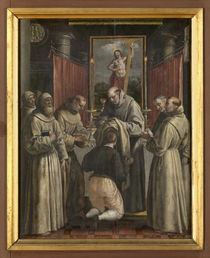The Catholic Defender: Saint Gregory of Narek
- Donald Hartley

- Mar 26
- 3 min read
Updated: Mar 28

Deepertruth with special permission and aid with Franiciscan Media, a great team for the Lord
Gregor was born in a village on the shores of Lake Van between 945 and 950. When his parents died, Gregor and his older brother were raised by a scholarly uncle who had them educated at the Narek monastery where he was a monk. The monastery was a prominent center of learning located in what is now Turkey. Gregor too entered the monastery and was ordained in 977.
A professor of theology, Gregor wrote a mystical interpretation of the Song of Songs, and a long mystical poem called the Book of Prayer or the Book of Lamentations. He described his poem as “an encyclopedia of prayer for all nations.” This classic of Armenian literature has been translated into 30 languages. The Russian text of the Book of Lamentations was set to music in 1985.
Little else is known about Gregor, other than he died in the early 11th century and was buried within the walls of the Narek monastery where he had spent his life. In 2015 as the world observed the 100th anniversary of the Armenian genocide in the Ottoman Empire, Pope Francis concelebrated a Mass at the Vatican with Patriarch Nerses Bedros XIX Tarmouni and declared the monk, poet, and saint of the Armenian Apostolic Church, Gregory of Narek, a Doctor of the Church. His liturgical feast is celebrated on February 27.
As opposed to the Armenian Catholic Church that began in the 17th century, the earlier Armenian Apostolic Church did not accept the Council of Chalcedon’s 451 teaching that Christ was fully divine and fully human. In 1996, St. John Paul II and Apostolic Catholicos Karekin I signed a declaration confirming the common faith of their two Churches. Prayer often unites groups of people who have seen themselves as very distinct—even enemies.
To you, Christ, I will flee", from the Book of Lamentation by St. Gregory of Narek:
As far as salvation is concerned, the power of man is shown to be limited in itself. And so you, Author of all blessings, pour out your mercies on us. You, the Almighty, give us strength. You, our Defender, to whom all things are possible, call us to you and pardon us. At your generosity, our Liberator, we rejoice. By you, Incorruptible God, we are made proof against all infirmities and given life. By you, our Renewer, we are illuminated. And so, knowing what my human nature is, I will flee to you, Christ, Son of the living God, wholly Blessed.
Moreover, looking back at the words I had written which led to this prayer, what I wrote then is further justified thus: “It is better to fall into the hands of the Lord than into the hands of men, for as he is great, so also is his mercy great”.
In this book of Lamentations I do not seek to belittle the merits of those who beg for salvation: for without merit, it is impossible to approach God.
But I glorify the Name of the Lord and I praise his grace which is directed to all people. In my words I proclaim all those who have, by a good life, risen to great honour, through the healing power of your great mercy.
For you are Life; you are Salvation; you are Wholeness; you are Immortality; you are Blessedness; you are Enlightenment!
Grant me peace from the sadness of my sins, so that you may have peace, my Judge, from my weeping, my nagging, and the importunities with which I constantly bother you.
For the only thing that truly pleases you is the salvation of man, O forever Blessed! Amen.
St. Gregory of Narek, pray for us!





















Comments